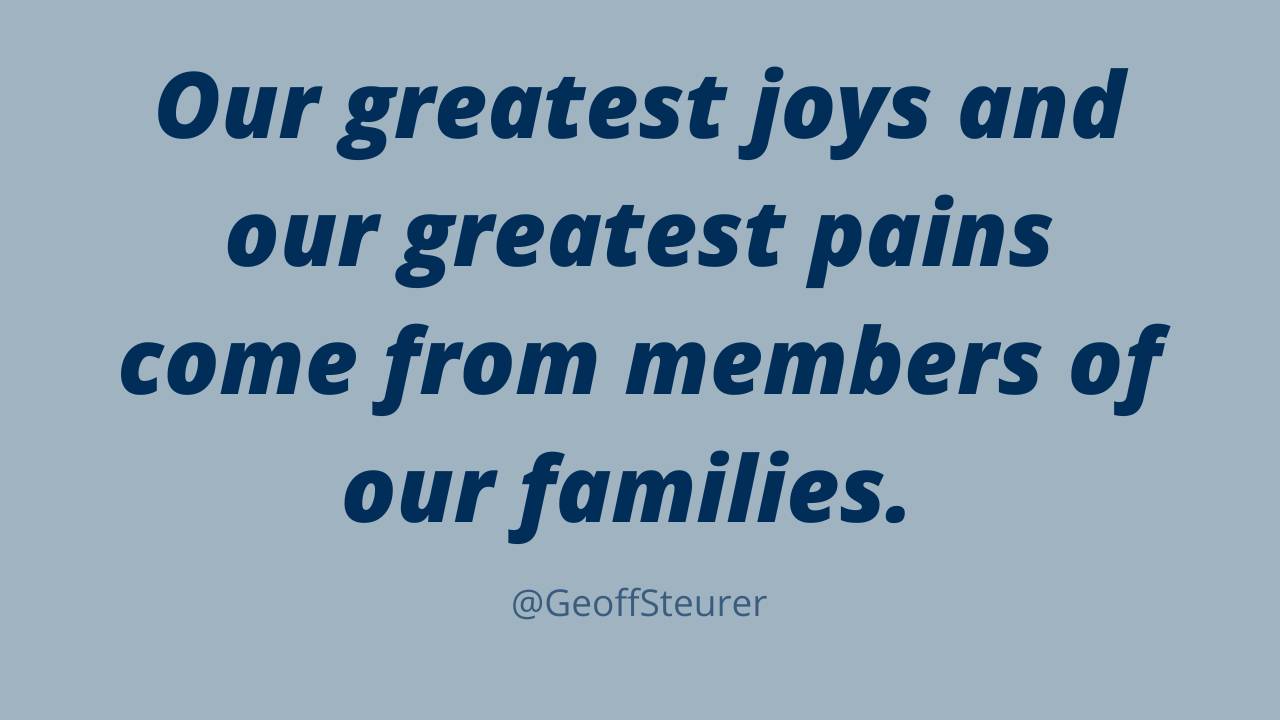Q&A with Geoff: How Do I Know if My Mother Really Loved Me?
Jan 18, 2023
Question
My mother passed away recently. I love my mom, but I don’t have the fondest memories of her. My parents are great in many ways. Growing up they were a wonderful example of service to others.
But I was a sad and lonely child in need of attention. My mom was always busy. I noticed my mom and sister would talk but she and I didn’t have conversations. I remember only two compliments I received from my mother. However, growing up she often said to me things like, “You’re so dense.” My sister didn’t get criticized.
I would clean the house often, probably wanting praise that I didn’t get. My parents didn’t hug us or express their love for us kids or to each other. We didn’t have family time together.
Shortly before her passing, when my sister walked in the room, she said, “There’s my favorite daughter.” My mother didn’t take an interest in my children, but my sister’s children were doted on, which my children noticed.
In my mind, I rationalized a good childhood. How do I come to terms with everything?
Answer
The childhood wounds of emotional neglect and criticism are very real, as they’re imprinted when we’re in our most dependent and vulnerable state. They can create templates for how we do relationships. They can impact our view of God. I hear how painful it’s been to go through life longing to have your mother see you in a way that made sense to you.
It’s even more difficult when your sister and her family received the affection and attention you desperately craved. Losing your mother means, at least for now, there aren’t future earthly opportunities to have a direct corrective experience with her. Let’s talk about how you might begin to find some resolution with this tangle of emotions.
Our greatest joys and our greatest pains come from members of our families. Like all of us, you’ve experienced the full range of emotions in your relationship with your mother. The temptation, especially after someone passes, is to honor them by only spotlighting the positive memories.
The challenge, of course, is knowing what to do with the other memories that linger in the shadows.
If coming to terms with everything means you’re left only with secure and loving memories of your mother, then you’ll struggle to honor your experiences as you try to honor her. It’s healthy (and less crazy-making) to embrace both realities as equally true. Your mother had strengths and made important contributions to you and others.
She also didn’t show you the love and attention you craved. What’s it like for you to sit with both of those realities at the same time? I encourage you to stay with the tension of those truths and allow yourself to experience the full range of emotions that encapsulate your story with your mother.
It’s a natural tendency to focus on one side of our emotional experience. We can be buried in our grief and sadness. We can feel so much joy we never want it to end. However, our richest experiences are a product of the natural interactions of our emotions.
For example, it’s a common occurrence at funerals to see a mixture of tears and laughter as family and friends simultaneously mourn the loss and celebrate the life of their loved one.
Likewise, honoring our parents is less about putting them on a pedestal or agreeing with how they did things, but, rather, more about synthesizing the complexities of their lives. While we don’t have to overemphasize their weaknesses and struggles to validate our pain, we also don’t have to pretend they lived lives free of painful impact on those around them.
Seeing them as three-dimensional fellow travelers allows us to embrace our own messiness in life as we learn from their lives.
Because of your experiences in your home growing up, I’m guessing you committed years ago to show more love, affirmation and connection with your own children. I believe honoring our parents also includes learning from their humanness and committing to do better.
I certainly hope my children won’t be afraid to acknowledge the very real struggles in our home but also choose to learn and do better.
Also, I don’t think it’s necessary to judge the mistakes of our parents with snap conclusions about their character. Instead, I think it’s important to pull back the curtain and understand as much as we can about their unique life journeys.
While understanding these stories doesn’t erase the impact of their struggles, it can increase compassion for the complexities of their journeys.
I believe family healing is more likely to happen as we speak truth paired with compassion for ourselves and others. Showing this type of love will help you think about and speak about your experiences with your mother from a more truthful place that includes both the joy and sorrow. I trust that as you embrace the full scope of your experience with this compassion, you will find more healing for both you and your memories of your mother.
FREE: 3 Steps to End Your Marriage Argument
Download my free PDF guide and start making real progress to healing
We hate SPAM. We will never sell your information, for any reason.




